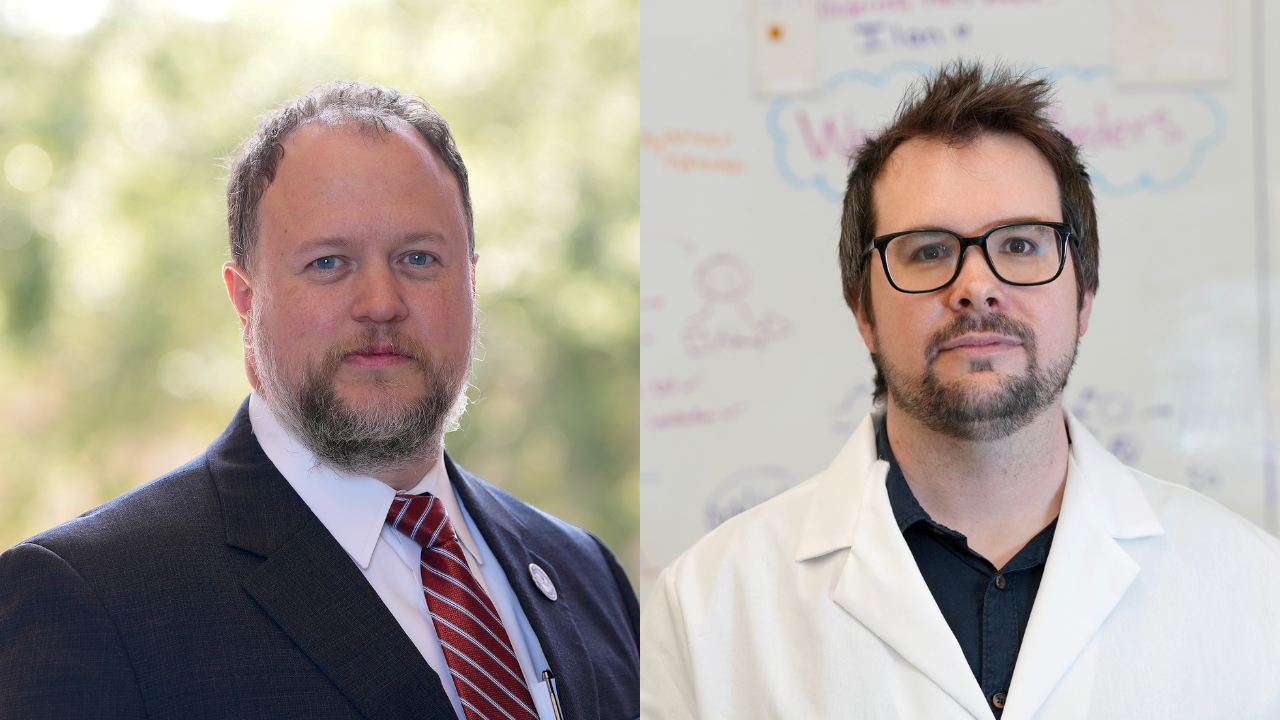NASA Solar System Ambassador Online Discussion Series
Astrobiology and Icy Worlds: Dr. Thomas B. Spencer and Dr. Eloi Camprubí-Casas

Written by María González
Photography by Jesús Alférez
RIO GRANDE VALLEY, TEXAS – NASA Solar System Ambassador and Associate Vice President for Research Operations, Dr. Thomas B. Spencer, recently hosted an online discussion with Dr. Eloi Camprubi-Casas, astrobiologist at The University of Texas Rio Grande Valley (UTRGV). The conversation delved into Camprubi’s research on the origin of life and the conditions of icy worlds in the solar system.
Spencer opened the discussion by expressing his enthusiasm for the conversation, stating: “We’ve got an excellent conversation today with Dr. Eloi Camprubi, who has got some amazing science he’s working through.”
Camprubi began by explaining the broad scope of his field: “Astrobiology as defined by NASA is the study of life's origin, evolution, and distribution across the universe. There are chemists, geologists, mathematicians, and engineers all contributing to space exploration missions, and their work falls under the umbrella of astrobiology,” he shared.
His research focuses on two key areas: the origin of life on Earth and the detection of life beyond Earth. He described his lab's work on understanding “how geochemistry becomes biochemistry and why life emerges in a planet that was devoid of life to start with.” Additionally, Camprubi’s lab investigates the detection of molecules in space, exploring whether their presence signals a biosphere or is simply the result of non-biological processes.
When asked about his journey into astrobiology, Camprubi recalled his early passion for space, saying, “Since I was a kid, I loved learning about space. I remember reading all of these encyclopedias back in Barcelona, Spain.” However, he eventually found a deeper interest in biology than in physics, which led him to pursue biomedical sciences before discovering his passion for astrobiology during a symposium on the origin of life.
Spencer highlighted one of Camprubi’s recent achievements—a NASA grant for simulating the icy surfaces of Europa. Camprubi described the ambitious project, named Boreas, a vacuum chamber built to mimic conditions on icy moons like Europa and Enceladus. “We call it Boreas, in honor of the ancient Greek god of the cold north wind, because we need to simulate very cold temperatures—minus 200 degrees Celsius,” he explained. The project aims to analyze chemical processes on these moons, providing valuable data for future NASA missions like the upcoming Europa Clipper.
The discussion also touched on the relevance of Camprubi’s work to future space exploration. With Europa Clipper set to launch in the coming years, Camprubi noted the practical applications of his research: “Our data can be used to tell NASA, ‘Look for these types of molecules during flybys.’” He highlighted the importance of understanding the chemical composition of icy worlds to distinguish between organic molecules originating from space and those from beneath the ice, where a potential alien biosphere could exist.
Additionally, Camprubi highlighted exciting opportunities for UTRGV students, including collaborations with major research institutions like the Southwest Research Institute (SWRI) in San Antonio and NASA’s Jet Propulsion Laboratory (JPL). “Now I’m writing plenty of other grants. Some of them have already been submitted where basically, if I get these grants, some of our students are going to go to JPL, or are going to go to Southwest Research Institute,” he said. This work, he added, opens the door for UTRGV students to “work on hands-on space science and space exploration, which is really exciting for me, and I believe for UTRGV students too.”
As the discussion concluded, Camprubi encouraged students interested in space sciences to consider UTRGV, noting the university’s growth and impact in the field. “We are skyrocketing,” he stated confidently, pointing to UTRGV’s new South Texas Space Science Institute as a hub for future research and innovation.
See video here: https://scholarworks.utrgv.edu/research_nasa/1/
For more information on NASA’s Solar System Ambassador program, visit NASA’s website.
ABOUT UTRGV
The University of Texas Rio Grande Valley (UTRGV) was created by the Texas Legislature in 2013 as the first major public university of the 21st century in Texas. This transformative initiative provided the opportunity to expand educational opportunities in the Rio Grande Valley, including a new School of Medicine, and made it possible for residents of the region to benefit from the Permanent University Fund – a public endowment contributing support to the University of Texas System and other institutions.
UTRGV has campuses and off-campus research and teaching sites throughout the Rio Grande Valley including in Boca Chica Beach, Brownsville (formerly The University of Texas at Brownsville campus), Edinburg (formerly The University of Texas-Pan American campus), Harlingen, McAllen, Port Isabel, Rio Grande City, and South Padre Island. UTRGV, a comprehensive academic institution, enrolled its first class in the fall of 2015, and the School of Medicine welcomed its first class in the summer of 2016.
MEDIA CONTACTS
Maria.Gonzalez6@utrgv.edu
Communications Manager, Research Communications | (956) 665-5852
Jesus.Alferez01@utrgv.edu
Communications Specialist, Research Communications | (956) 665-7908
